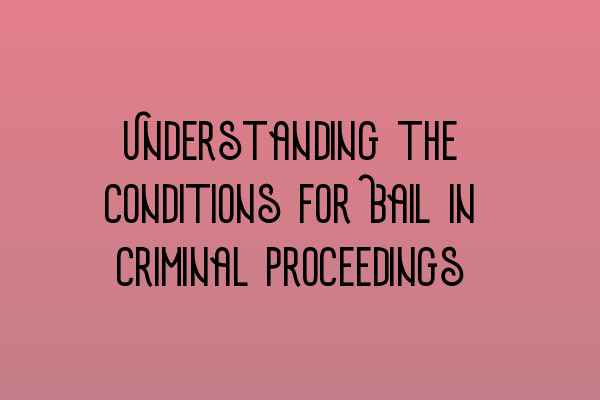Understanding the Conditions for Bail in Criminal Proceedings
As a reputable solicitor at SQE Criminal Law & Practice Law UK, I have encountered numerous cases where the conditions for bail in criminal proceedings can greatly impact the outcome of a case. Bail is a critical aspect of the criminal justice system, allowing individuals to be released from custody pending their trial. However, there are specific conditions that must be met to ensure public safety and prevent potential flight risks. In this article, we will delve into the intricacies of bail conditions, understanding their significance and how they can influence the course of a criminal case.
First and foremost, it is important to highlight the purpose of bail in criminal proceedings. Bail is designed to strike a delicate balance between the interests of justice and individual rights. Upon arrest, a person is typically brought before a court, where the decision to grant or deny bail is made. The court carefully considers various factors, including the severity of the alleged offense, the individual’s criminal record, and the likelihood of the person failing to appear for trial.
One of the primary objectives of imposing bail conditions is to ensure the safety of the public and potential witnesses. For instance, in cases where a person is accused of committing a violent crime, the court may impose strict conditions such as a curfew or a prohibition from contacting certain individuals involved in the case. These measures help protect vulnerable individuals and maintain public order.
Another essential aspect of bail conditions is their role in preventing potential flight risks. The court must assess whether the accused is likely to abscond or pose a significant risk of not showing up for trial. To address this concern, the court may impose conditions such as surrendering travel documents, reporting regularly to a police station, or even electronic monitoring. These measures help ensure that the accused remains within the jurisdiction and is available for court proceedings.
Moreover, the court may require the accused to provide financial security, commonly known as a bail bond. This form of security aims to guarantee that the accused will attend their court hearings. If the individual fails to comply with the conditions of their bail, the bond may be forfeited, resulting in additional legal consequences. It is crucial for individuals to understand the importance of adhering to bail conditions to avoid further complications.
It is worth noting that the specific conditions of bail can vary depending on the circumstances of the case. The court has the discretion to tailor the conditions to meet the unique needs and risks associated with each individual case. For example, in cases involving drug-related offenses, the court may order regular drug testing or require the accused to attend rehabilitation programs as a condition of their bail.
At SQE Criminal Law & Practice Law UK, we understand the complexity of bail conditions and their impact on criminal proceedings. Our team of highly skilled solicitors are well-versed in interpreting and negotiating bail conditions that are favorable to our clients. We strive to uphold the principles of justice while ensuring the best possible outcomes for our clients.
In conclusion, the conditions for bail in criminal proceedings play a critical role in ensuring public safety, preventing potential flight risks, and maintaining the integrity of the criminal justice system. Bail conditions must be carefully considered and tailored to the unique circumstances of each case. As solicitors at SQE Criminal Law & Practice Law UK, we are equipped with the knowledge and expertise to navigate the complexities of bail conditions, advocating for our clients’ rights and striving for favorable outcomes.
If you are preparing for the SQE exams or seeking additional resources regarding criminal law and practice, we recommend checking out our related articles:
– [SQE 1 Practice Exam Questions](https://fqps.co.uk/sqe/sqe1-preparation/mcq-practice-quiz)
– [SQE 1 Practice Mocks FLK1 FLK2](https://fqps.co.uk/sqe/sqe1-preparation/practice-mocks-quiz)
– [SQE 2 Preparation Courses](https://fqps.co.uk/sqe/sqe2-preparation)
– [SQE 1 Preparation Courses](https://fqps.co.uk/sqe/sqe1-preparation)
– [SRA SQE Exam Dates](https://fqps.co.uk/sqe/sqe1-sqe2-exam-dates)
For more information and expert guidance, feel free to contact us at SQE Criminal Law & Practice Law UK. We are here to assist you every step of the way.
